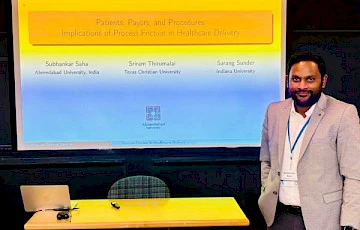30 June 2025
Examining Shareholding Thresholds in Indian Firms

Ownership structures within the Indian corporate landscape present a unique set of challenges, such as highly concentrated ownership, stringent debt markets and overlooked agency issues, where the interests of owners and managers may not always converge. Understanding how these factors interact with firm performance is crucial for a firm’s health and for enhancing its value.
Professor Vibha Tripathi from Ahmedabad University’s Amrut Mody School of Management investigated the critical threshold of shareholding where the interests of promoters and non-promoters align with firm performance, offering valuable insights for policymakers.
The study, which utilised fixed effects (FE) panel models, analysed a comprehensive sample of 306 firms listed in the BSE 500 from 2013 to 2022. To address potential endogeneity concerns, the researchers employed generalised method of moments (GMM) estimations. Their methodology involved classifying shareholding into four distinct ranges: less than 25 per cent, between 25 and 50 per cent, between 50 and 75 per cent, and more than 75 per cent. The classification allowed for the precise identification of the shareholding threshold where stakeholder interests converge and positively impact firm performance.
The research revealed that all categories of shareholding, whether held by Indian promoters, foreign promoters, institutional non-promoters, or non-institutional non-promoters, positively and significantly influence firm performance. This impact was observed across various performance metrics, including Return on Assets (ROA), Return on Equity (ROE), and Tobin's Q. Additionally, researchers identified the classification 50-75 per cent to be a critical range for promoter ownership. Within this range, the interests of both promoters and non-promoters were found to align optimally, leading to an enhancement in firm value.
Conversely, the study found that firms with less than 25 per cent promoter shareholding experienced detrimental effects on firm value. On the other hand, firms with promoter shareholding exceeding 75 per cent showed no significant enhancement in firm value. The researchers further supported their findings with meta-data and sub-sample analysis, providing a foundation for their conclusions. Based on these comprehensive results, the study offers clear recommendations for policymakers to encourage and maintain promoter shareholding within the optimal range of 50-75 per cent.
The findings, part of the study Critical Thresholds for Ownership Shareholding: Evidence from India, coauthored with Professor Sankarshan Basu from IIM Bangalore, were presented at the 8th International Management Conference, held at Cambridge University. The research offers a data-driven approach to optimising corporate governance and enhancing firm value. The results complement recent amendments by the Securities and Exchange Board of India (SEBI) requiring a minimum public shareholding of 25 per cent in Indian firms.



